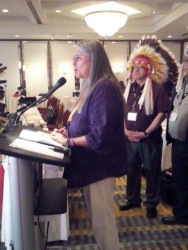Article Origin
Volume
Issue
Year
Bill C-10, the Contraband Tobacco Bill, was one of the many issues discussed at the 40th Annual All Ontario Chiefs Assembly that took place in Toronto from June 9 to June 11. The chiefs were unanimous in their rejection of Bill C-10 calling it a direct attack on the livelihood of First Nations people.
At the press conference held June 10, Ontario Regional Chief Stan Beardy said, “We reject Bill C-10 because it criminalizes us and it criminalizes tobacco trade. It is a direct attack on our constitutionally-protected Aboriginal and treaty rights.”
Chief Ava Hill of the Six Nations of the Grand River said there were a number of things that had to be addressed with respect to the Bill and said, “this is not just an issue that pertains to Six Nations, although it seems that the government is targeting some of the Iroquois communities. It’s affecting the whole region of Ontario.”
The tobacco industry at Six Nations employs 2,000 people, said Hill, “and if these people are going to be criminalized and are forced to give up their businesses, it’s going to be devastating for our people. If those people don’t have jobs, where are they going to go? Is the government going to increase our welfare rolls and provide more money for our people to go on welfare?”
Forcing people to go on welfare will have an effect on their self esteem, Hill said, and it will add to the social problems that have already been created by the legacy of residential schools.
“We get funding cutbacks every time we turn around,” she said, leaving a void of services and programs. People suffering job losses will not have any place to turn for help.
“We are trying to generate revenue for our community,” Hill said, “and now they want a piece of that.”
The propaganda being spread by the government, Hill said, is that organized crime is involved in the tobacco trade.
“They’re trying to paint our people as terrorists,” Hill said. “We’re not terrorists. We’re just families trying to look after our people.”
Christine Green is a member of the Haudenosaunee Trade Collective, a newly-formed cooperative whose goal is to provide education and information about the potential effects of Bill C-10 on First Nations communities. Green is a tobacco grower.
“We’re very troubled by the irresponsible and offensive comments that the government continues to make about Aboriginal people,” Green said, “that we’re creating unsafe environments for our people. We challenge that because we don’t deal in drugs or weapons, we’re not human trafficking. Those are the types of things they’re saying about us. It’s 100 per cent not true. We don’t want those things in our communities either.”
Green said the tobacco businesses are “truly mom and pop operations” that employ 20 per cent of the working age population of Six Nations. Other businesses are growing because of the employment and the success of the tobacco industry. She also said the Collective estimates they have given at least $2 million back to the community for programs and people in need.
“We’re not all about these bad things that everybody likes to paint Native people with,” Green said. “We’re not bad. We are good people, working with good minds and we’re working to try and support our economy and our community as best we can.”
During the discussion in the chiefs’ meeting leading up to the press conference, Grand Chief Mike Mitchell said Akwesasne is negotiating with the Ontario government on a pilot project with regard to the tobacco industry. Jurisdictional issues, regulatory systems and sharing of tax revenues are being discussed, he said. Akwesasne has been licensing tobacco manufacturers for about the past 20 years and has the regulatory systems in place, he said.
Ontario wants a piece of the revenue too, Mitchell said, and, “what we offered them was that the revenues would stay in the community.” Akwesasne wants to reinvest the revenues into other forms of economic development, taking advantage of the community’s location on the St. Lawrence River to develop a tourism industry. The discussions are ongoing.
Chief Hill said Six Nations has the capability to regulate the tobacco industry in their community and this is something they are looking at. In the meantime, Six Nations will continue to lobby with the Senate for hearings on the Bill and is mounting a public relations campaign to ensure the Canadian public is fully aware of the potential impacts of the Bill.
“It’s going to affect the economy of the municipalities that are surrounding our reserves,” Hill said, “because a lot of our people spend a lot of money off-reserve in the surrounding communities.”
- 2425 views



